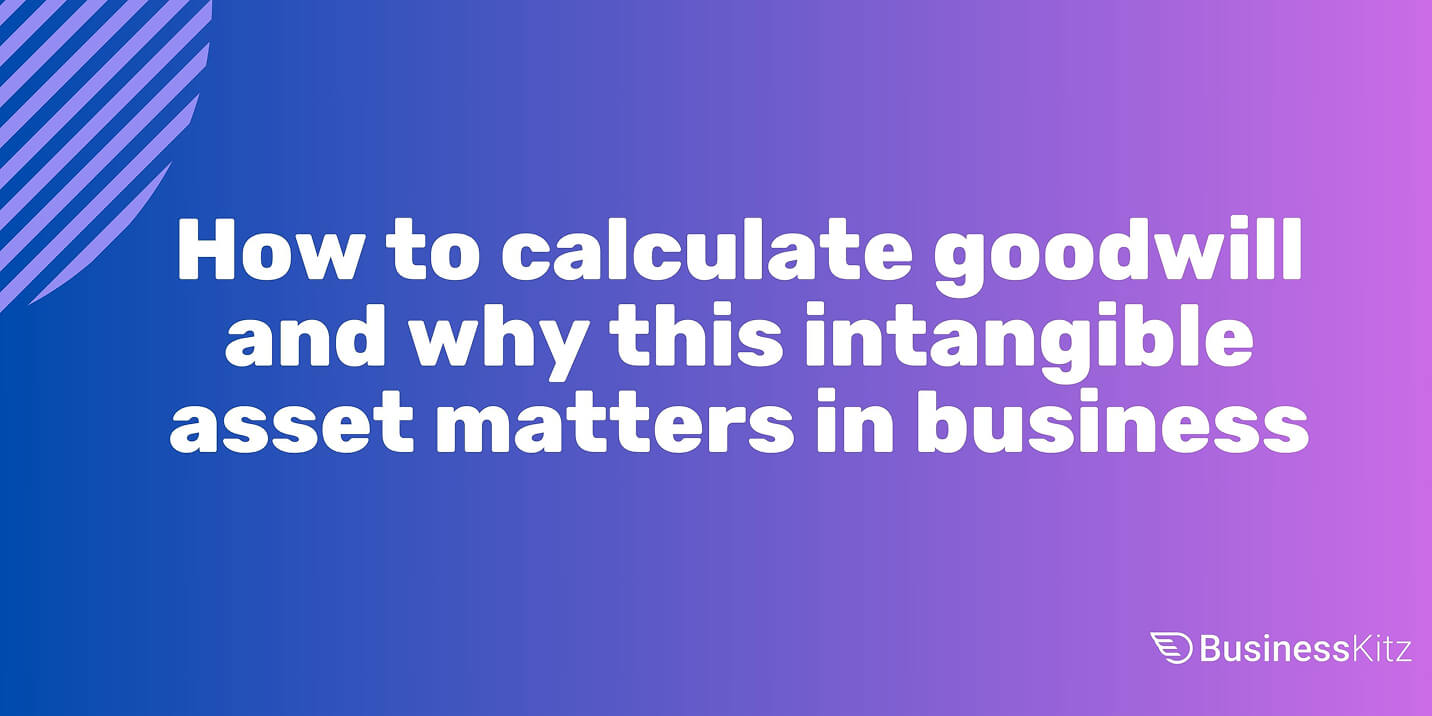
We've helped businesses save $55m with our all-in-one platform. Get instant access to this template and 115+ others, plus AI-powered document creation, starting completely free.
Understanding goodwill is essential for businesses, investors and accountants. It represents the extra value of a company beyond its identifiable assets and liabilities. Goodwill reflects brand reputation, customer relationships and business strength. It plays a key role in business acquisitions, financial reporting and valuation.
This guide explains how goodwill works, how to calculate it and why businesses must manage it carefully. It also explores goodwill impairment, its impact on financial statements and how different industries rely on goodwill for long-term success.
Goodwill is an intangible asset representing a business’s brand reputation, customer relationships and market strength. It appears on a balance sheet when a company is bought for more than its net assets. Goodwill affects financial statements, influences business acquisitions and requires regular impairment tests to ensure accurate valuation and compliance with IFRS and GAAP standards.
[ez-toc]
Goodwill is an intangible asset representing a company's extra value beyond its identifiable assets and liabilities. It reflects factors like brand reputation, customer relationships and business strength. When a business is sold, goodwill is the premium paid above the fair value of its net assets.
Investors and buyers consider goodwill when assessing a company’s worth. Unlike tangible assets such as property or equipment, goodwill is not something a business can sell separately. It remains linked to a company's long-term success.
Goodwill consists of several essential elements:
Businesses record goodwill when a company is acquired for more than its net assets. This reflects the additional value of goodwill beyond its physical and financial assets.
Example:
A company has:
Goodwill calculation:
$7 million purchase price – $5 million net assets = $2 million goodwill
The $2 million goodwill is listed as an intangible asset on the company’s balance sheet.
Goodwill is one type of intangible asset, but it differs from items like patents or trademarks. Other intangible assets have explicit legal protections and independent fair value.
FeatureGoodwillOther intangible assetsDefinitionValue from reputation, customer base and relationshipsLegal or contractual rights (e.g. patents, copyrights)RecognitionOnly recorded when a business is acquiredCan be internally generated or acquiredAmortisationNot amortised; subject to impairment testsOften amortised over useful lifeExampleStrong brand name, skilled workforcePatent, software license
Businesses must report goodwill separately in financial statements. Unlike other intangible assets, goodwill has an indefinite life and does not depreciate. Instead, companies must test goodwill annually for impairment loss.
Goodwill affects a company’s valuation and earnings per share. Investors rely on goodwill figures to assess a company’s book and carrying values. Proper classification ensures compliance with International Financial Reporting Standards (IFRS) and Generally Accepted Accounting Principles (GAAP).

Businesses must calculate goodwill when an acquisition occurs at a price higher than the target company's net assets. This difference represents the value of goodwill, which includes brand reputation, customer loyalty and business relationships.
To calculate goodwill, use this formula:
Goodwill = Purchase Price – (Fair Market Value of Assets – Liabilities)
A company acquires another for $10 million. The acquired business has:
Calculation:
The $5 million goodwill is recorded as an asset on the balance sheet under intangible assets.
An inflated goodwill figure can mislead investors and impact financial transparency. Overstated goodwill may lead to impairment loss if the business underperforms. Proper valuation prevents overpayment and protects earnings per share. Companies must follow IFRS and GAAP to ensure accurate reporting in business combination deals.
Goodwill plays a key role in business success. It represents the intangible asset that gives a company a competitive edge. Different industries rely on goodwill in unique ways.
1. Retail: Retail businesses depend on customer trust and brand recognition. A well-known brand attracts repeat customers and boosts sales. Stores with a strong brand reputation can charge higher prices. Customer loyalty also reduces the need for costly marketing.
Example: A well-established clothing brand has a loyal customer base. Buyers may pay more for this company due to its strong goodwill.
2. Professional services: Law firms, accounting firms and consultants rely on client relationships. Strong goodwill helps these businesses keep clients and attract new ones. Skilled employees also add to goodwill.
Example: A law firm with a respected reputation will attract high-value clients. This increases its fair market value of identifiable assets.
3. Tech startups: Startups often have little tangible assets. Instead, they rely on intellectual capital, proprietary technology and a growing user base. Investors consider these factors when valuing a tech company.
Example: A startup with innovative software and a growing customer base has goodwill. Its carrying value reflects its future potential.
Businesses create goodwill by:

Goodwill impairment occurs when the carrying value of goodwill exceeds its fair value. This means the business can no longer justify the goodwill recorded on its balance sheet. When this happens, the company must adjust its financial statements by reducing the book value of goodwill and recording an impairment loss.
Unlike tangible assets, goodwill does not depreciate or lose value through amortisation. Instead, businesses must conduct annual impairment tests to ensure goodwill reflects its true worth. If overstated, goodwill can mislead investors and negatively impact a company's financial standing.
When goodwill becomes impaired, businesses must lower their reported assets, which can:
Companies must comply with IFRS and GAAP when reporting goodwill impairment to ensure financial transparency.
Several factors can lead to goodwill impairment:

Goodwill plays a key role in business acquisitions. It represents the value of goodwill beyond a company’s identifiable assets and liabilities. Buyers assess goodwill to determine if a business is worth more than its book value. Strong goodwill can justify a higher purchase price, while weak goodwill may lower a company’s fair market value of identifiable assets.
A company with a strong brand reputation, customer loyalty and skilled employees can demand a premium paid above its net assets. Buyers must carefully assess goodwill to ensure they do not overpay. Understanding goodwill helps set a fair purchase price reflecting the business’s value.
After an acquisition, businesses record goodwill as an intangible asset on the balance sheet. If goodwill is overstated, it may lead to an impairment loss, reducing the company’s earnings per share and affecting investor confidence. Companies must follow IFRS and GAAP to report goodwill accurately and prevent misleading financial statements.
Goodwill helps businesses maintain stability after an acquisition. A strong customer base, skilled workforce and industry reputation contribute to future earnings. However, the acquiring company may struggle to sustain profits if goodwill declines.
Goodwill impacts a company's profit allocated in financial statements. If goodwill remains strong, it adds to the company’s value and boosts investor confidence. However, if goodwill is impaired, the company must reduce its book value, which can lower earnings and affect residual equity.
Private companies also record goodwill during business acquisitions. However, they follow different accounting rules compared to public companies. Some private businesses include white papers in their valuation process to support goodwill calculations. Unlike public firms, private companies have more flexibility in impairment testing.
No, goodwill cannot be sold independently. It remains attached to the business as a whole. Unlike patents or trademarks, goodwill does not have a quantifiable market price unless a company is sold. It is only recorded during an acquisition when one company pays more than the historical cost of another business.
During insolvency, a company’s goodwill loses most of its value. Goodwill is often written down or removed from the balance sheet if a business cannot meet its financial obligations. Creditors focus on tangible assets since goodwill holds little resale value in liquidation.
The Internal Revenue Authorities consider goodwill an intangible asset with an indefinite useful life. It cannot be depreciated like physical assets but must be tested for impairment. Tax treatments for goodwill vary by jurisdiction and may impact a company’s financial reports.
Goodwill valuation does not directly rely on government data. Instead, it is based on financial records, market conditions and investor expectations. However, businesses may reference economic reports and original reporting to support their goodwill figures.
When two companies merge, the acquiring business records goodwill separately from other intangible assets. This ensures transparency in financial reporting. Goodwill has no historical cost like other assets, so it requires ongoing impairment tests to reflect its true worth.
Businesses should:
Accurate goodwill reporting protects investors and prevents financial misstatements. Kindly ensure goodwill is calculated correctly to maintain financial transparency.
Goodwill does not include miscellaneous intangible assets like patents, copyrights or trademarks. Unlike these, goodwill cannot be independently valued or sold. It remains tied to a company’s overall worth.
Goodwill is an intangible asset that reflects a company’s brand reputation, customer relationships and market position. It adds value beyond identifiable assets and liabilities and plays a key role in business acquisitions. Buyers consider goodwill when setting the purchase price of a company and assessing its financial statements.
Accurate goodwill calculation ensures businesses do not overpay during acquisitions. Regular impairment tests help companies maintain financial transparency and prevent unexpected impairment losses. If goodwill is overstated, it can reduce earnings per share and mislead investors.
Managing goodwill properly strengthens long-term success. Businesses must protect customer loyalty, retain skilled employees and comply with IFRS and GAAP standards.
Businesses can rely on Business Kitz for professional documentation and compliance solutions. Their resources help ensure accurate valuation, financial reporting and regulatory compliance.
Copyright © 2025 Business Kitz 14312161